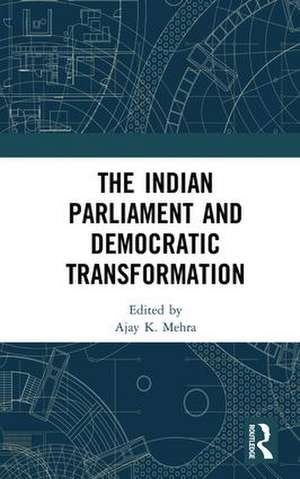The Indian Parliament and Democratic Transformation
Editat de Ajay K. Mehraen Limba Engleză Hardback – 21 noi 2017
The volume frames major debates surrounding the Parliament through historical, conceptual and contemporary political perspectives. It also looks at how politics in practice is being continuously changed and challenged by new social media and further views the transformation of India’s apex legislative institution in terms of democratizing processes, constitutional values and changing mores.
The book will be of great interest to scholars and researchers of Indian politics, history, comparative politics, political science and modern India.
| Toate formatele și edițiile | Preț | Express |
|---|---|---|
| Paperback (1) | 259.98 lei 6-8 săpt. | |
| Taylor & Francis – 12 dec 2019 | 259.98 lei 6-8 săpt. | |
| Hardback (1) | 1000.27 lei 6-8 săpt. | |
| Taylor & Francis – 21 noi 2017 | 1000.27 lei 6-8 săpt. |
Preț: 1000.27 lei
Preț vechi: 1219.84 lei
-18% Nou
Puncte Express: 1500
Preț estimativ în valută:
191.42€ • 198.71$ • 159.62£
191.42€ • 198.71$ • 159.62£
Carte tipărită la comandă
Livrare economică 24 martie-07 aprilie
Preluare comenzi: 021 569.72.76
Specificații
ISBN-13: 9781138243835
ISBN-10: 1138243833
Pagini: 396
Ilustrații: 2 Line drawings, black and white; 22 Tables, black and white; 2 Illustrations, black and white
Dimensiuni: 138 x 216 x 30 mm
Greutate: 0.45 kg
Ediția:1
Editura: Taylor & Francis
Colecția Routledge India
Locul publicării:Oxford, United Kingdom
ISBN-10: 1138243833
Pagini: 396
Ilustrații: 2 Line drawings, black and white; 22 Tables, black and white; 2 Illustrations, black and white
Dimensiuni: 138 x 216 x 30 mm
Greutate: 0.45 kg
Ediția:1
Editura: Taylor & Francis
Colecția Routledge India
Locul publicării:Oxford, United Kingdom
Public țintă
PostgraduateCuprins
List of Figures and Tables. Contributors. Foreword. Preface. List of Abbreviations. Introduction Part I Institutional Perspective 1. Parliament: The Formative Years, 1952-72 2. Indian Parliament: Changing Institutional Moorings 3. Why is the Indian Parliament in a State of Decline? Part II Issues in Representation 4. The Indian Parliament and its Mode of Political Representation 5. Parliament as a Representative Institution: An Assessment 6. The Nature of Democratization of the Parliament: A Study of Membership Profile of Lok Sabha Part III Making the System Accountable 7. Parliamentary Accountability in India: Contestations and Performance 8. Parliament and Accountability: Enforcing Responsibility 9. Opposition and Parliamentary Accountability: Who Sets the Agenda? 10. An Analysis of Disruptions in Parliament 11. Parliamentary Control of Delegated Legislation: The Hazards of Erroneous Delegation 12. ‘Responsibility’ and ‘Accountability’: Confidence and No Confidence Motions in the Indian Parliament Part IV Parliament & Other Institutions 13. From Panchayats to Parliament: Exploring Interfaces 14. The First and the Fourth Estates in India Part V Miscellaneous Perspective 15. Parliamentary Staffing: Expertise and Coordination 16. Parliament in India’s Foreign and Security Policy: From a Conscience Keeper to an Active Arbiter 17. Parliament as a Spectacle: Politics by Other Means. Index
Notă biografică
Ajay K. Mehra is a political scientist affiliated with the University of Delhi and coordinates the activities of the Centre for Public Affairs, a network institution of public intellectuals.
Descriere
This book traces the trajectory of the Indian Parliament from its formation to present day. The essays presented here explore parliamentary democracy through the formative years and highlight the Parliament’s function as a representative and accountable institution, its procedures and responsibility, its connection with the other arms of the state, its relationship with grassroots democracy and the press, and its critical role in framing foreign policy and national security.
